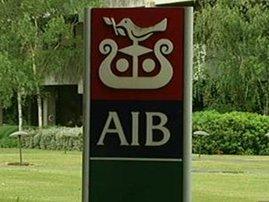Rich reap rewards of bank bailout

AIB SHARES fell back a bit yesterday. At 12.30pm they were at €1.75, down by 2.8 per cent on the previous day, but hanging in there. They had been at €3.20 in late September, which was a splendid performance, given all the turmoil. After all, the share price had been at a miserable 27 cent back on March 5th, and the rally since then has been quite impressive, don't you think?
Had you the prescience to buy, say, €100,000 worth of shares on March 3rd, they would have been worth about €1.2 million by late September, and about €650,000 at 12.30pm yesterday. A nice little earner. And you had better believe there are a few sharp guys around town who still have loads of smart money, and you can bet your bottom dollar, if you still have it, that they have done quite well, thank you, on bank shares - even in these dismal times.
But what is it about the banks that has caused the share price to improve so dramatically these last eight months? It is hardly a perception that the economy has rebounded from the recession and the good times are back. Neither is it likely to have been the revived property boom - not a lot of evidence of that. New management in the banks? What new management? New boards of directors? What new boards of directors?
So, what could it be?
Simple. You and I have caused this resurgence in bank shares, because you and I have given €7 billion to the two largest banks for a meagre 25 per cent of their shares. Even by yesterday at 12.30pm, AIB was worth €3.5 billion, and a quarter of that is €875 million. Not great value for our €3.5 billion investment in the bank.
It wasn't just our €3.5 billion investment that caused the bank shares to surge - it was an understanding that if the banks need further investment, we will give them more, as much as they need. And, crucially, we will give it to them, not in return for more equity (for the prospect of that would collapse the share price), but in return for promises to repay the money some time. Maybe.
And, oh yes, the banks' share prices have rallied because of the National Asset Management Agency, or is that the special purpose vehicle? We have taken all the bad loans out of the banks - or are about to do so - again in return, not for equity (which would give us a chance of sharing in any share price boost), but in return for more promises.
And, crucially, we have given the banks a blanket guarantee - a guarantee to their depositors, to their bondholders and to their lenders via the inter-bank system.
The money we have given AIB allows them to pay their new managing director a salary of €500,000, actually €633,000, if the Government allows them their way. The people agreeing to make this pay arrangement are those who caused the bank to nearly collapse earlier this year, or at least presided over its near collapse.
And the guy they want to give the €633,000 to was part of the senior AIB management.
To repeat what has become a familiar refrain during the last year, we were told that if we pay these top bankers peanuts we will get monkeys. However, we have paid them millions, and we still got monkeys.
So, what is the point in paying this guy €500,000, or €633,000, since, along with the other monkeys, he shares the blame for the collapse? Why not pay him peanuts?
Like, say, a bit above the minimum wage?
Aside from that, why is it that speculators are enabled to make yet more fortunes on bank shares when the speculation revolves solely around how much we, as a society, are willing to give the banks - how many more bailouts and guarantees - while refraining to take a large equity share.
We were told we could not nationalise the banks, for then the monies that would be required to fund them would be added on to the State's accounts, thereby making borrowing generally more difficult and more expensive. But now we know that the EU is willing to have the figures massaged to keep debt off the State's balance sheet - it is doing so in relation to Nama - so why were the banks not to be taken over and nationalised?
Another argument advanced is that the State doesn't know how to run the banks. But do those who still sit on the boards of the banks know how to run them? They are the ones who brought the banks down around their ears and, more relevantly, around our ears.
I was out in St Michael's estate in Inchicore last week, meeting women involved in community development projects. Every one of these women struck me as far more likely to be able to run the banks than, say, the crowd on the board of AIB.
Yes, they know nothing about banking, but, clearly, neither do the crowd on the board of AIB - and the women are certainly more able and more intelligent.
And a good deal less greedy.
